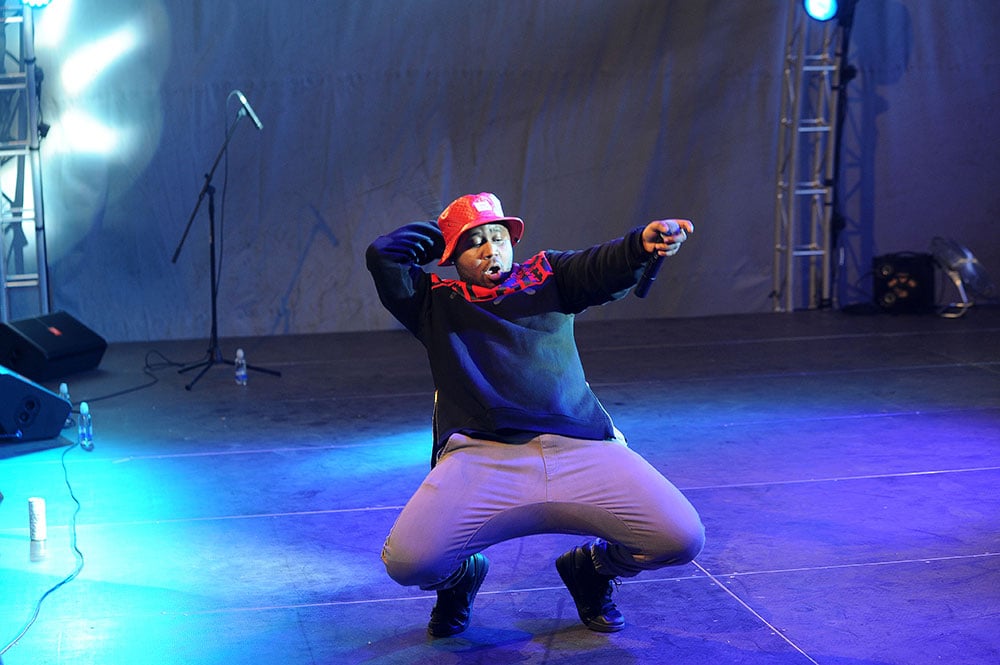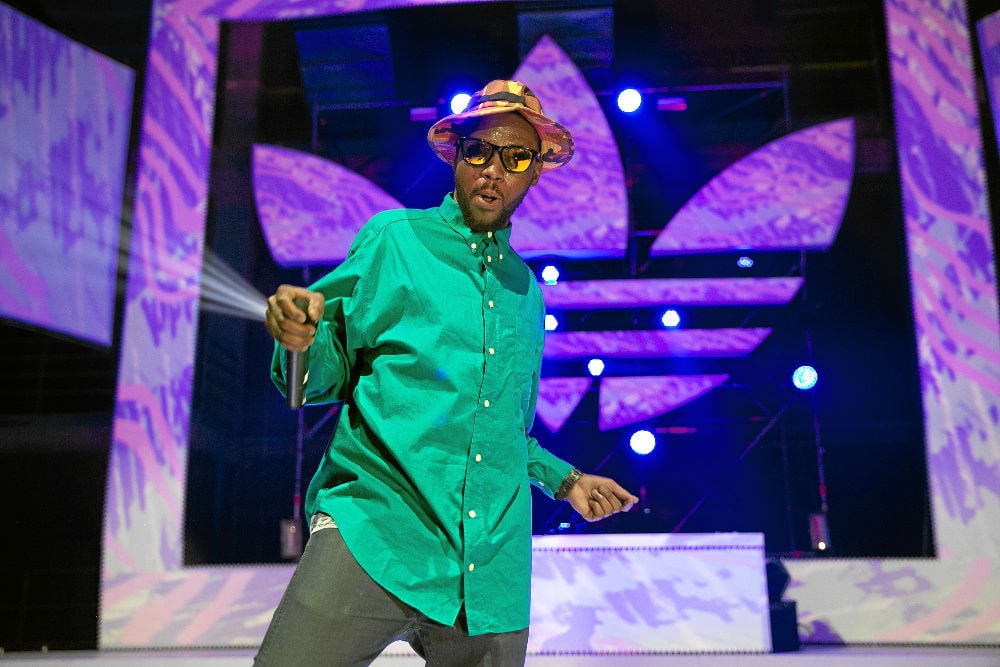Save for Cassper Nyovest
Cape Town rapper Youngsta has, over the years, solidified his fanbase in his home town and counts himself a direct consequence of South African group Prophets of da City’s influence on local hip-hop.
POC served insidious lyrics and subversive beats to hip-hop from the late 1980s, when they started out, and their music was banned by SABC regulators who found them too militant.
Despite Youngsta’s best efforts to build and maintain an independent operation since 2011, when he was releasing one mixtape after another, he remains bubbling below the radar. Youngsta states that he will not “keep [his] mouth [shut] or conform to what the mainstream standard is”.
It’s a statement that doesn’t need much deciphering. Young artists like him have found it close to impossible to break into the mainstream South African hip-hop market. Dedication, a relentless work ethic and a solid discography, featuring work with founding Prophets of da City member DJ Ready D among others, seem inadequate for him to break through on a national scale.
Here’s the problem: if you don’t let enough new blood in, the scene will become a festering shithole of intergenerational marriages and the subsequent interbreeding it brings. In the past 10 years, the South African rap market has seen a variation of the same faces in different formats.
Some of the current biggest rappers, such as AKA and K.O, started out in critically acclaimed groups – they had a foothold or a fanbase familiar with them as public figures and the necessary music industry connections on which to build their solo careers.
Save for Cassper Nyovest, there haven’t been any new rappers on the scene in a while. He’s one of the biggest rappers we’ve ever seen, and even he occasionally voices his frustration at always being made to feel like an underdog by the country’s nascent rap music industry.
He used the power of social media to launch a rant-cum-truth sermon, which began with him tweeting: “I won’t lie. I’m so hurt. Yoh!!! Taba tsa lefatshe (News of this world)!!!” when the South African Music Awards did not nominate his single Doc Shebeleza for the coveted Record of the Year category. This he did in spite of being nominated in five others.

Cassper Nyovest. (Supplied)
Nyovest had created a little buzz before appearing on Hip Hop Pantsula’s Wamo Tseba Mtho’, but it’s that co-sign from an established figure in the industry that increased his chances of becoming known beyond his hometown of Mahikeng.
“The fact that our young bloods don’t have space in the actual offices when they are pretty much the majority of the consumer baffles me,” says Kitso Moremi, alias Justice, one half of the Fratpack fraternity (his brother Kabelo, alias Mr Calibre, is the other half).
Their enviable discography has music made with cats such as Okmalumkoolkat and the still-rising Mashayabhuqe KaMamba, and their growing list of videos – the gritty homage to their ’hood Sebokeng in Home Pt 2 (Oh One Six), or their tentative tongue-in-cheek tribute to sneaker culture Kick Rhymes or Kick Rock – make them the prototype blue chip cool kids for an alt-rap market which is starved because the all-knowing industry won’t let them in.
He points at the “record execs and radio music compilers who aren’t really fans of the culture” as another hindrance. There’s a greater conversation to be had about how young guns occupy vacuous chambers, making incredible left-field rap before even managing a mere mention on a blog.
Pretoria-based Sean Samuels, who raps as Riz Ventura, is one. His view is that the centralisation of media in Johannesburg is partly to blame, but adds that it wouldn’t be much of a problem if there was equal representation in terms of the volume of work being produced, and what makes it on to the radio.
“It’s like the national broadcasters are operating like regional ones,” he says.
When asked what would solve the problem, Justice says: “It’s hard to say because we’re on the outside too and if I knew how to fix it. I would have a management company letting new bloods in.”

Clarissa Sosin. (M&G)
It’s an art and numbers problem, which echoes the sentiments of the 1990s rap adage “we don’t believe you/ you need more people”. The art can be as sharp, as incisive, as visceral, but for a rapper with zero affiliations in the right places, there won’t be any numbers to add up.
The tides are shifting, but shifting slowly. Part of Nyovest’s current success lies in his foresight.
“We came up with this whole module or structure to be independent, fully independent. My music can come to Zimbabwe because of the way we structured our social media. Our music is free and anybody can download it. You never know where it’ll end up, you know,” he told the hosts of the Zimbabwe-based podcast 2 Broke Twimbos during his visit to the country earlier this year.
Nyovest’s online fanbase served as his entry point into the mainstream. They’re the ones who shared, re-tweeted and downloaded links to all his biggest singles. The two-time South African hip-hop award-winning emcee Gigi LaMayne has been one to watch for a while, and has collaborated with rap royalty such as Tumi and Pro-Kid.
Her recent deal with the talent agency Dreamteam SA – home to Khuli Chana – might just add impetus to the wind of change blowing across the landscape. For the wind to become a cyclone, there first needs to be a hip-hop industry, not a scene living off crumbs meant for other, more widely accepted genres.
As it stands, the urban festival Back to the City, held in inner-city Johannesburg on Freedom Day for the past nine years, is one of the only events that gives a viable platform to emerging acts. It’s far from perfect, but at least it’s an attempt to diversify.
As an institution, Prophets of da City have been nurturing talent since breaking out and they continue to do so in one form or another despite not being active since the early 2000s. Their latest incarnation features original members such as Ramone and DJ Ready D, and includes those who were inducted into the Prophets’s institution over the years, such as erstwhile Godessa member EJ von Lyrik and 5th Floor rhyme surgeon emcee Kasual T.
They’ve shown that it’s possible to mentor different generations passing through their doors and to give them a chance.
Perhaps the rap industry can learn some lessons.
- An earlier version of this article incorrectly attributed the following quote to Justice: “Their enviable discography has music made with cats such as Okmalumkoolkat and the still-rising Mashayabhuqe KaMamba, and their growing list of videos – the gritty homage to their ’hood Sebokeng in Home Pt 2 (Oh One Six), or their tentative tongue-in-cheek tribute to sneaker culture Kick Rhymes or Kick Rock – make them the prototype blue chip cool kids for an alt-rap market which is starved because the all-knowing industry won’t let them in”. The correction has been made.